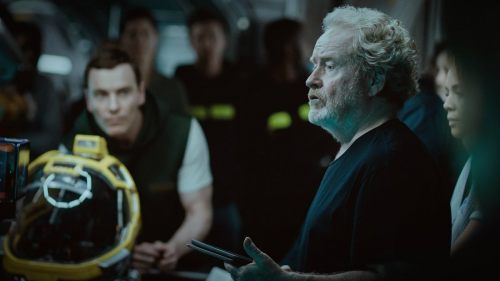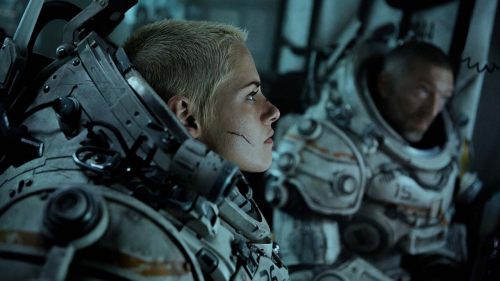ALIEN Is Dead; Long Live COVENANT
This post contains big ol' spoilers for Alien: Covenant.
Sir Ridley Scott tried something new in his Alien prequel Prometheus, and it backfired. A massively flawed film, full of stupid character decisions and logic issues, it also displays great ambition, daring to go off its franchise’s beaten path - a tricky proposition indeed. Angry fans either lambasted Scott for not making the movie they wanted (i.e. a retread of the franchise’s still-extant masterpieces) or for making the movie in the first place. Promoting the film’s sequel Alien: Covenant, Scott told Yahoo Movies:
They wanted to see more of the original [monster] and I thought he was definitely cooked, with an orange in his mouth. So I thought: 'Wow, OK, I'm wrong'.
For Covenant, Scott succumbed to that feedback, but still maintained course into the weird territory promised by Prometheus. In doing so, he delivered a fascinating and entertaining film that retroactively improves its predecessor and even develops themes from earlier Scott joint Blade Runner. He also demonstrated that he wasn’t wrong to jettison the original alien back in 2012.
Covenant feels stuck between two different franchises: Alien on one hand, and whatever Prometheus is on the other. The Alien bits are the least successful, retreading narrative and cinematic ground that’s been trodden into mud by now. Though the setpieces are well-choreographed, and the newly CGI xenomorph looks great, the formula's just tired. In fact, it may actually be impossible to make a fresh and interesting “straight” Alien movie nowadays. Does anyone feel anything but familiarity when presented with Giger’s biomechanics now? Is anyone shocked when a chestburster bursts a chest? Can the xeno come back from having fucking plush toys made of it? Fans may have thought they wanted more of the original monster, but fans never know what they really need. Scott was right: the xenomorph is done.

Stick a fork in it.
While Alien: Covenant suffers when reprising Alien, its middle hour - when it tumbles headfirst into Prometheus’ thematic abyss - is some of the most intriguing big-budget sci-fi in recent memory, refocusing Prometheus’ meandering thematic content into something leaner and meaner. While Prometheus painted Michael Fassbender’s android David as inexplicably obsessed with the life-seeding Engineers, Covenant makes the picture much more complete. The themes of creation and destruction, the relationships between creator and creation - they all crystallise together, thanks to a massive reduction in scale.
In compressing Prometheus’ ideas into dialogue scenes between creation-obsessed David and consciously uncreative Walter, Covenant’s best material gets down to business. Make no mistake: David and Walter are the film’s main characters, though the excellent Katherine Waterston gets more screen time as human colonist Daniels. Ridley Scott is clearly more interested in his pair of Fassbenders, wrestling as they are with the limitations placed upon them by their creators. The movie is a spiritual successor to Blade Runner as much as anything Alien, acting as the showcase movie Roy Batty never got. Roy famously demanded “more life” from his inventor; what better way to attain life than to create it yourself, as David does with his xenomorphs? David even says “that’s the spirit” when Daniels attacks him, echoing Batty’s identical line in his fight with Rick Deckard. We are meant to make this connection. It works.
David sees himself as a creator, and he is, having re-engineered the Engineers’ bioweapon to a state of alleged perfection. But he’s only a creator in the J. Robert Oppenheimer model, building instruments whose sole purpose is to destroy. “Look at what I did,” he seems to say, with his misattributed Shelley quotes and grandstanding speeches to Walter and Billy Crudup’s Oram. He’s like a kid psychopath strangling the family dog or setting his house on fire: exterminating the Engineers and building xenomorphs makes him feel powerful, like he’s done something of magnitude. But what does he do once the dog is dead? Once the whole family is dead?

Because...they're definitely dead.
Family, too, is important to the new films’ strange mythology. The good ship Covenant is filled with colonist couples ready to start new families; David and his creator Peter Weyland share a father-son relationship, expanded to a family when David meets his “brother” Walter; so, too, does David clearly consider his xenomorph creations his children. The film’s nesting relationships of creator and creation - Engineers, humans, androids, Weyland, David, xenomorphs - are mirrored in the life cycle of the alien itself, a creature laying an egg containing a creature containing another egg containing another creature. About the only way the idea could have been furthered is if Walter had killed David, becoming more like him in the process, completing the conversion process David begins in the sexually-charged flute scene.
Covenant’s twisted family values also reflect in its religious themes. Though Prometheus’ discovery of the Engineers would seem to refute God’s existence, religious allusions are rife throughout Covenant. It’s no coincidence that Oram, the film’s most prominent person of faith, serves as the first-ever xenomorph incubator. When considering religious covenants - pacts between gods and people - communion and transubstantiation instantly spring to mind. What more intimate, transformative covenant could there be than having one’s body used to birth a new being, in an immaculate conception of nightmares? Even David himself plays vessel for his facehugger children, smuggling them onto the Covenant inside his mechanical belly. David believes himself to be a god entering into Valhalla, or so his musical selections suggest. But he isn’t one. If the Engineers are gods (and within this fiction, they effectively are), David is the Devil, born of man’s arrogance, raining destruction onto the gods themselves in a perverted echo of his creators’ creators.
All of this is transmitted through a brilliant pair of performances by Michael Fassbender, who in a just world would be showered with awards for his work here. But we do not live in a just world - a fact Covenant constantly reminds us.
Viewing Covenant and Prometheus from the robot’s perspective (or rather, the robots’ perspective) brings their ideas into sharp relief. Like Blade Runner, which also improves when watched from the replicants’ points of view, Covenant has little concern for humanity. Many complained that Ridley Scott seemed to hate Prometheus' human characters, but Covenant’s doubling-down on that cruelty makes me wonder whether that’s necessarily a bad thing. Covenant isn’t just mean; it revels in suffering, taking glee in terror and finding beauty in well-orchestrated doom. In David’s world, it’s an inevitability that creations will destroy their creators, so we might as well welcome it. It’s such a strange, unpopular philosophy - building to a bleak, hopeless, thrilling ending - that I can’t help but respect it.
Covenant's determined steps into the thematic unknown confirm something I'd suspected since Prometheus. Ridley Scott is using the Alien franchise as a cover, smuggling an entirely original science fiction story into mainstream theatres by sleight of hand. If these were “pure” prequels, I'd have little interest in what would surely be increasingly tiny, agonising steps from the end of Covenant to the start of Alien. But I don't believe Scott's interested in telling an origin story. He's got other ideas - ideas funded handsomely by Fox under the guise of a popular franchise. And hey - if anyone has the right to mess with Alien, it's Ridley Scott.

You try doing this stuff at 79.
At Scott’s age (incredibly, he turns 80 this year), it seems natural to ponder subjects like death, destruction, and meeting one’s creator, especially after the death of one’s brother and creative partner. Scott has spent a career creating; like the Engineers, he may be fascinated or afraid of the destructive side of the equation. If Alien, made nearly forty years ago, represents fears about sex, as critics have explored thoroughly, this new series (however long it ends up) is about the fear of death - and the fear of one’s own creations. It makes poetic sense that Scott’s using his career-making monster to reflect upon that career. Is he worried that his Alien films will kill him? Is he consciously making more of them until they do?
Whatever Scott's motivation, the Alien prequels are turning into a weird, mean-spirited meditation on creation and destruction from a filmmaker with a lot to reflect on. Covenant has made me re-evaluate Prometheus; maybe it’ll even bring me to like Blade Runner a little more, too (I’ve never managed anything more than appreciation for its craft). Scott may be filling in Alien’s backstory gaps, to fans' dismay, but he’s bucking prequel traditions by making that gap-filler phenomenally interesting.
The modern Alien franchise is a misanthropic fable about creativity, religion, and a Peter O’Toole-impersonating killer robot.
Deal with it.



